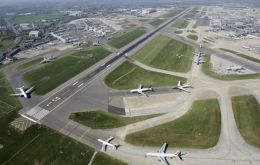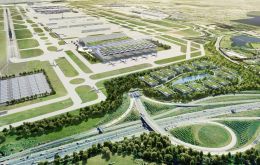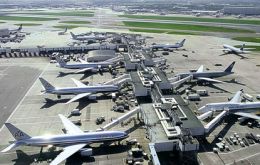MercoPress. South Atlantic News Agency
Tag: Heathrow
-
Monday, March 1st 2021 - 08:45 UTC
Heathrow to levy an extra £8.90 to departing passengers in an effort to cover pandemic costs

London's Heathrow airport will charge departing passengers an extra £8.90 in an effort to claw back costs as the coronavirus crisis depresses air travel. The tariff is permitted by the UK's aviation regulator under a protocol that allows the hub to cover costs for utilities, baggage and check-in services.
-
Wednesday, February 12th 2020 - 11:24 UTC
Heathrow may fall behind Paris as Europe’s number 1 airport hub

Despite record-breaking start to the year at Heathrow, latest figures show that EU competitor, Charles de Gaulle, is growing at twice the rate and is set to overtake as Europe’s leading hub airport within the next 2 years.
-
Tuesday, June 26th 2018 - 09:01 UTC
Heathrow airport third runway approved in Parliament, but hurdles remain

British lawmakers on Monday approved plans to expand Heathrow Airport near London after years of study and debate, but the construction of a third runway still faces significant hurdles.
-
Tuesday, February 27th 2018 - 08:58 UTC
Heathrow is UK's largest port by value: £106bn worth of goods; needs urgent expansion

Britain’s exporters risk being held back by a lack of access to key trading markets, new data has revealed. As Britain prepares to leave the EU, the data shows that key routes from Heathrow to Shanghai, Delhi, Mumbai, Los Angeles, Tokyo Haneda and Dubai are virtually full and unable to accommodate further growth in trade. Combined, these six routes alone account for nearly 18% of Heathrow’s total cargo volumes.
-
Wednesday, January 3rd 2018 - 10:37 UTC
Heathrow aggressive program to make the airport cleaner and quieter

Environmental charges at Heathrow are set to increase by 7% as the airport seeks to minimize its impact on local communities. From 1st January 2018, airlines are being incentivized to deploy their newest aircraft at Heathrow – making the airport cleaner and quieter for local communities.
-
Thursday, August 23rd 2012 - 05:44 UTC
Edinburgh the most welcoming UK airport; Paris and Moscow the rudest in Europe

Luton is the UK’s most unfriendly airport, with Edinburgh the most welcoming, according to a survey. The Bedfordshire airport got the thumbs-down from travellers asked to rate the friendliness of staff in a poll by travel search site Skyscanner.
